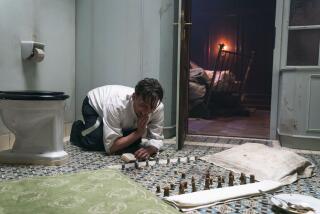THE ASSAULT by Harry Mulisch; translated by...
- Share via
THE ASSAULT by Harry Mulisch; translated by Claire Nicolas White (Pantheon: $12.95). The assault of the title, actually the assassination of a Nazi collaborator, occurs very early in the book. One night, six shots ring out outside Anton Steenwijk’s home in occupied Holland. Moments later, a neighbor and his daughter dump the body of the police chief in front of Anton’s house. Naturally, the Nazis burn down the house and execute Anton’s family. But because Anton is only 12, he is spared after being tossed for a night into a dark cell occupied by a woman whose face he never sees. By that time, we’re on Page 52, out of 185, and “all the rest is a postscript.” That postscript covers the next 36 years in the life of Anton, who becomes a doctor determined to forget that awful night. But the author won’t let him, or there would be no story. There isn’t much of one, anyway. Mulisch may be “Holland’s most important postwar writer”--the jacket says so--but this book is weakened by Anton’s passivity and by some rather far-fetched coincidences. However, there are flashes of brilliance, mainly in three powerful confrontations in which Anton’s past comes back to haunt him. The first occurs in 1956, when Anton, now 23, returns to his flat during an anti-Communist riot and is jostled by a rioter--who turns out to be the assassinated police chief’s son--some coincidence--and who justifies his father’s actions as the work not of a Nazi traitor but a dedicated anti-Communist. The next coincidental encounter comes in a cafe after a funeral, 10 years later. Anton overhears a stranger sitting next to him talk about having fired several shots at a traitor. Anton and the stranger, a man named Takes, compare pasts and Anton learns not only that Takes was the man who fired the fatal shots more than 20 years ago, but also--that the woman in Anton’s cell that night was Takes’ girlfriend and his accomplice. More than 15 years pass before the next--and climactic--accidental tete-a-tete. In 1981, Anton is drawn into an anti-nuclear demonstration, and who bumps into him in that crowd of almost a million? Why it’s the daughter of the neighbor who had helped dump the traitor’s body in front of Anton’s house. She recognizes him immediately--this after 36 years!--and, in a moving scene, she tells Anton the rest of what he never really wanted to hear in the first place. The final revelation, which again touches on the hero-traitor question, is truly a jolt.
More to Read
Sign up for our Book Club newsletter
Get the latest news, events and more from the Los Angeles Times Book Club, and help us get L.A. reading and talking.
You may occasionally receive promotional content from the Los Angeles Times.








